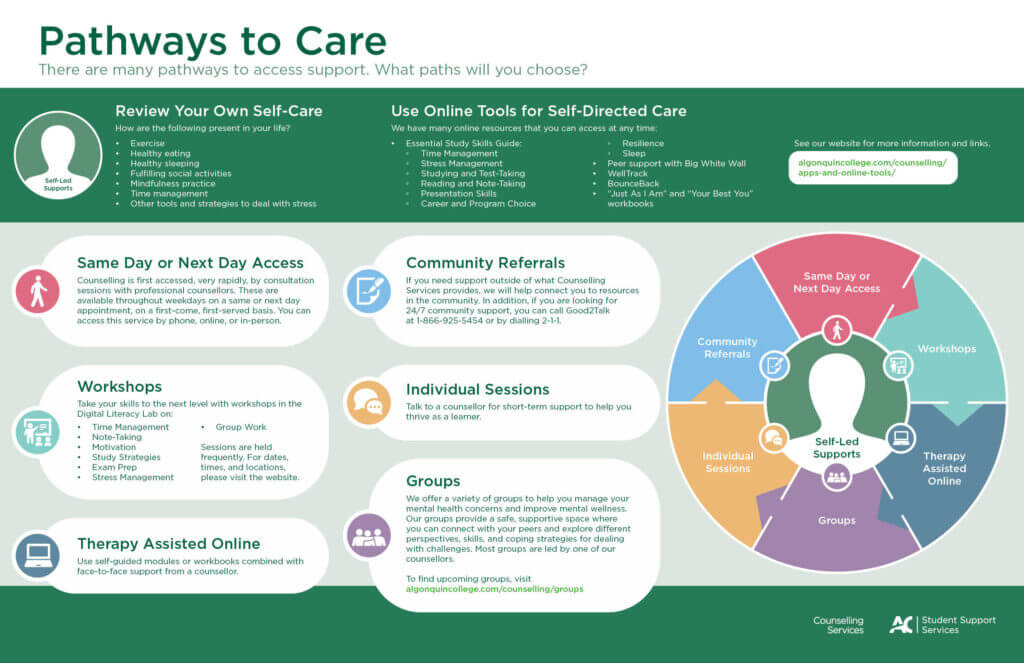Algonquin College (AC) Counselling Services has experienced a steady increase in the number of students requesting and receiving services. This increased demand is not unique to AC; post-secondary counselling centres across Canada are reporting the same pressures. The traditional “45-minute face-to-face therapy hour” is a relatively inflexible form of service. Increasingly, students are seeking innovative services that fit with their busy lives, are integrated with the online world, and fulfill their desires for immediate options and strategies.
Pathways to Care is based on the Stepped Care Model which was developed for primary care in the UK. It has been successfully re-imagined for rapid access to mental health care in a variety of settings, including post-secondary counselling centres. Algonquin College is following in the footsteps of McGill University, University of British Columbia, and Memorial University of Newfoundland, among others, while implementing a unique version of this model at Algonquin College.
Pathways to Care is based on several key principles, including the following:
- Students are usually very busy with courses, employment, family duties, and recreational activities; thus, service delivery should be tailored to individual students’ needs and to the extent of time, energy, and motivation the student has to commit to the change process.
- Students have primary responsibility for their own psychological health and wellness, and decisions about services and care should be collaborative and unique.
- Counselling and wellness support vary in terms of their intensity – including the effort required of the student.
- Initial access to services should be as rapid as possible.
In Pathways to Care, the less intensive services include: campus activities focused on engagement and prevention, open-access wellness learning through online and print resources, and drop-in groups and workshops. The mid-range intensity includes support and personal development groups, provincial support programs with online coaching and workbooks, and check-ins with a counsellor every 2 or 3 weeks. The highest intensity services include group counselling for anxiety/depression, one-to-one individual counselling, medical/psychiatric referral, and referral to specialized treatment programs in the community.
Counselling is first accessed, very rapidly, by consultation sessions with professional counsellors. These are available throughout weekdays on a same or next day appointment, on a first-come, first-served basis. At this initial consultation, the counsellor explains our service options, our policies of who may access service and for how long, and what kinds of support are available at the Counselling Centre in the Pathways to Care model. A confidentiality and privacy of information form is signed and explained.
The student is then invited to describe their concern and what they would like to work on. Following this, the student and counsellor work together to identify what type(s) and intensity of service and support are most appropriate for the student at that point in time. If a follow-up session is included in this plan ane can be booked at this time. The counsellor and student will engage in ongoing assessment of the student’s level of functioning, well-being, and progress. For mental health appointments, this assessment is done using the Behavioural Health Measure (BHM20) assessment tool. Other assessment tools may be used as well, to enhance service and to ensure that students are always actively involved in counselling options and decisions.
Counselling Services views the implementation of this model as dynamic and evolving. Any questions, concerns, input, or feedback should be directed to Deidre MacDonald, Manager, Student Counselling and Wellness Supports and Welcome Centre: macdond3@algonquincollege.com.
 Starting in September 2018, Counselling Services made important changes to the way we serve students. The goal of these changes is to improve access, flexibility, and effectiveness of our service delivery.
Starting in September 2018, Counselling Services made important changes to the way we serve students. The goal of these changes is to improve access, flexibility, and effectiveness of our service delivery.